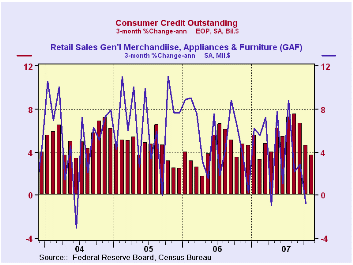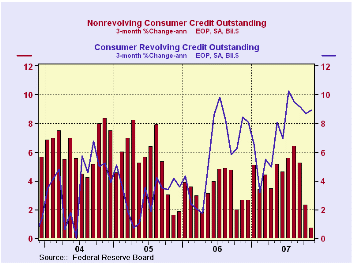 Global| Jan 09 2008
Global| Jan 09 2008U.S. Consumer Credit Growth Up in November, Trend Down Sharply
by:Tom Moeller
|in:Economy in Brief
Summary
At an annual rate, consumer credit grew 7.7% in November. That was a recovery from the depressed 1.0% gain in October. In a sign of weaker consumer spending, year to year the 5.2% growth in credit is down slightly from its recent peak [...]

At an annual rate, consumer credit grew 7.7% in November. That was a recovery from the depressed 1.0% gain in October.
In a sign of weaker consumer spending, year to year the 5.2% growth in credit is down slightly from its recent peak of 5.4%. The three month change however is down sharply to 3.7%, half the growth rate of this past August.
The accompanying chart indicates just how sharply the growth in consumer spending has slowed. Sales of general merchandise, appliances and furniture (major items that are financed) declined slightly in the three months ended in October.
Non-revolving credit, which accounts for nearly two thirds of the total, grew a somewhat slower 3.9% in November versus October, but the three month growth rate collapsed to 0.7% from its peak of 6.4% in August.
Revolving credit grew a faster 12.0% in November versus October, but here again the 9.0% three month growth rate is down from the 10.2% rate of growth this past July.
These figures are the major input to the Fed's Flow of Funds accounts for the household sector, released quarterly. For the third quarter, an acceleration in consumer credit growth (as evidenced by the three month peaks noted above) was accompanied by a sharp acceleration in bank loans.
Dollars and Sense is a recent speech by William Poole, President of the Federal Reserve Bank of St. Louis and it is available here.
| Consumer Credit (m/m Chg, SAAR) | November | October | Y/Y | 2006 | 2005 | 2004 |
|---|---|---|---|---|---|---|
| Total | 7.7% | 1.0% | 5.2% | 4.5% | 4.3% | 5.5% |
| Revolving | 12.0 | 8.9 | 7.4 | 6.1 | 3.1 | 3.8 |
| Non-revolving | 3.9 | 4.1 | 3.9 | 3.6 | 4.9 | 6.4 |
Tom Moeller
AuthorMore in Author Profile »Prior to joining Haver Analytics in 2000, Mr. Moeller worked as the Economist at Chancellor Capital Management from 1985 to 1999. There, he developed comprehensive economic forecasts and interpreted economic data for equity and fixed income portfolio managers. Also at Chancellor, Mr. Moeller worked as an equity analyst and was responsible for researching and rating companies in the economically sensitive automobile and housing industries for investment in Chancellor’s equity portfolio. Prior to joining Chancellor, Mr. Moeller was an Economist at Citibank from 1979 to 1984. He also analyzed pricing behavior in the metals industry for the Council on Wage and Price Stability in Washington, D.C. In 1999, Mr. Moeller received the award for most accurate forecast from the Forecasters' Club of New York. From 1990 to 1992 he was President of the New York Association for Business Economists. Mr. Moeller earned an M.B.A. in Finance from Fordham University, where he graduated in 1987. He holds a Bachelor of Arts in Economics from George Washington University.
More Economy in Brief
 Global| Feb 05 2026
Global| Feb 05 2026Charts of the Week: Balanced Policy, Resilient Data and AI Narratives
by:Andrew Cates






